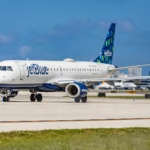This week Airbus signed a formal agreement committing to develop the way hydrogen is used across the aviation industry. The memorandum of understanding (MOU) was cosigned by Air Liquide Korea, Incheon International Airport (ICN) and Korean Air.
The agreement comes in the wake of South Korea’s commitment to achieving carbon neutrality by 2050 and Airbus’ hope to develop the first zero-emission hydrogen-powered commercial aircraft by 2035.

A comprehensive approach
Each of the four companies will be hoping to demonstrate their vast expertise in overcoming the long list of challenges associated with introducing an alternative-fuelled aircraft across the aviation industry.
Air Liquide, a prominent supplier of industrial energy solutions, is hoping to develop and conquer the hydrogen fuel supply chain all the way from production to distribution. ICN will be able to plan what infrastructure changes may be required at airports specifically in terms of fuel delivery to terminals. Korean Air is offering advice on the management and operations of aircraft on the ground. Finally, Airbus itself will outline the features of the new aircraft and energy use of the new fleet as a whole.
“Roadmap” for hydrogen use
The announcement has firmly placed South Korea at the forefront of the global aviation shift towards alternative energy. Anand Stanley, President of Airbus Asia-Pacific, said he was hoping to provide a “roadmap” for the development of hydrogen use that could be employed by other Korean airports in years to come.
MUOs relating to the development of alternative fuels have become increasingly common in recent years, with corporations such as Shell, Siemens and ExxonMobil all committing to develop green technologies in their own way. This announcement may signal the first solid, concerted effort amongst key aviation players towards making the sustainability changes the industry has been so apparently eager to make.
Is the dawn of hydrogen-fuelled aviation finally upon us? Let us know what you think in the comments below.









